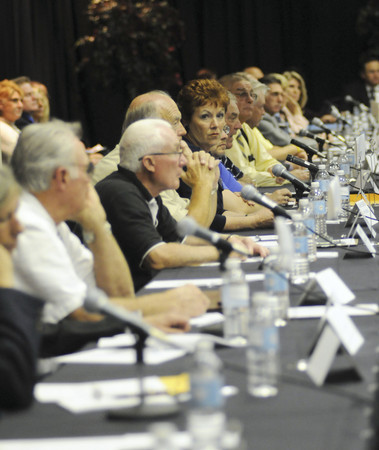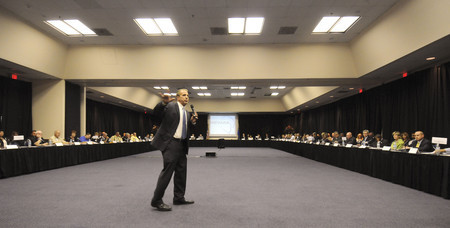Home rule discussion called a good first step
Las Vegas Councilman Steve Ross wanted to know: How many people in the room wanted some form of home rule for their city or county.
After all, he said, "What's this meeting all about?"
At tables lined up around the large room in the Henderson Convention Center, elected officials from cities and counties across Nevada raised their hands in support.
"That's pretty significant," Ross said.
At least 80 officials from across the state gathered Wednesday for a local government summit focused primarily on one question: How can local governments protect their interests in tough economic times when so much of what they are able to do is dictated at the state level?
"We need to be speaking as one voice across the state of Nevada," said Ron Schmitt, a member of the Sparks City Council. "If we come into this not fully together, we're going to be picked apart."
There was no action taken at the meeting, and most of the discussion was generalities and possibilities.
Officially, they were there to discuss three pieces of legislation passed earlier this year calling for studies on the powers of local government, the state's revenue structure and the potential benefits of consolidating government units and services.
Work is just starting on those reports, which are due before the next legislative session in 2011.
But issues of home rule and revenue are pressing on local governments now as the economic downturn squeezes revenue for everyone, and as state leaders already have looked to the local level to plug gaps in the state budget.
Earlier this year, lawmakers took $50 million from a fund counties use to cover indigent people hurt in accidents and $79 million in property taxes generated in Clark and Washoe counties.
That will continue to be an attractive target, Reno Mayor Bob Cashell said.
"It's very evident that the state cannot continue to operate on a sales-tax-type government," he said, which leaves property taxes as the most attractive and stable place to look.
"If they're coming after our property taxes, what can we get back?" he asked, suggesting having the state take on services now filled at the local level.
When local governments wrestle with a shortfall that threatens services, they can't raise taxes to get the needed revenue without the state's permission, said Nancy Boland, Esmeralda county commissioner.
Ross and Clark County Commissioner Lawrence Weekly said that the home rule discussion is not just about taxes. Even a change in something as routine as code enforcement law, Weekly said, can necessitate legislative involvement.
After the meeting, Weekly talked about how the statutes hinder the county in cleanup efforts, such as towing away junky, unused cars from residential areas. In many instances, the county must follow state procedures.
"It handcuffs us," Weekly said. "It stifles what we need to do to bring the hammer down on negligent property owners."
The summit brought together counties and cities to find solutions to such problems instead of just complaining about lack of home rule, Reno City Councilwoman Jessica Sferrazza said. "They (voters) don't want to see us pointing fingers. They want to see us making changes."
Clark County Commissioner Chris Giunchigliani said the counties and state must find common ways to serve their constituents.
Given the length of and the level of detail involved in the process, there no longer can be an "us versus them" mentality, Giunchigliani said.
"If we continue down that road ... you're just going to continue to not be successful," she said.
A large part of the summit was taken up with discussions about consolidating city, county and state services into regional bodies that many leaders say are more efficient. The Metropolitan Police Department and the Southern Nevada Health District are examples of consolidation.
Consolidation doesn't cut costs drastically, but it does deliver services efficiently to all residents, and it can curb cost increases, Washoe County Manager Katy Simon said.
One impediment to consolidation is a state rule that allows employee unions to "cherry pick" the best benefits from the labor contracts of the entities that would merge, Sferrazza said. That is among a number of rules that should be revisited, she said.
Some of changes contemplated in the studies would be dramatic. They involve reforms as large as the state tax code and as minute as combining the salary schedules of formerly separate agencies, and there's no quick and easy way to cut through the work that would have to be done.
One way of extending home rule to local governments would be to amend the state constitution. That would require voters to twice pass a statewide ballot initiative, or the Legislature would have to approve such an amendment twice in addition to getting statewide vote approval. The change would take years.
Clark County Commissioner Larry Brown said the summit was a good first step. "The communication between cities, counties (and) the state has to improve dramatically," Brown said.
Giunchigliani warned of demanding autonomy without having a clear plan for exactly what local governments want and how they would use it.
"Be careful what you ask for," she said.
Contact reporter Alan Choate at achoate@reviewjournal.com or 702-229-6435. Contact reporter Scott Wyland at swyland@reviewjournal.com or 702-455-4519.
Slideshow


















